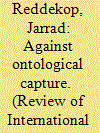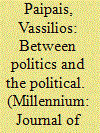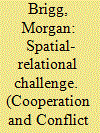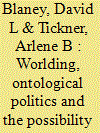|
|
|
Sort Order |
|
|
|
Items / Page
|
|
|
|
|
|
|
| Srl | Item |
| 1 |
ID:
187533


|
|
|
|
|
| Summary/Abstract |
This article offers an experiment in theorising within or across a ‘space’ of ontological disagreement – which, as numerous authors have contended, characterises much that is at stake in relations between states and Indigenous peoples in the Americas. Such ontological disagreements, I argue, contain radical potential for disrupting globally dominant and anthropocentric patterns of thinking and relating, and for generating alternatives. I substantiate this point with reference to the relational ontologies informing different Indigenous ways of analysing and practicing existence. Drawing on Amazonian Kichwa thinking and Anishinaabe accounts of treaties, I show how these relational ontologies recast the problem of how it is possible to relate with difference, in such a way as to fold an inter-human ‘international’ into a continuum of relations that include human-nonhuman ones. Distinct normative horizons emerge. I argue that non-Indigenous people can draw a range of provocations here concerning our constitution as selves and the political space in which we understand ourselves to possibly participate. I also claim, however, that this more transformative potential is predominantly squandered through processes of what I call ontological capture, which troublingly re-entrench dominant construals of reality and forestall a more radical questioning and re-patterning of accompanying lifeways.
|
|
|
|
|
|
|
|
|
|
|
|
|
|
|
|
| 2 |
ID:
133550


|
|
|
|
|
| Publication |
2014.
|
| Summary/Abstract |
This article situates H. Morgenthau's thought in the context of post-foundationalist theorisations of the difference between politics and the political. In doing so, it shows how Morgenthau's sophisticated realism refused to circumscribe the antagonistic dimension of politics and introduced the study of international politics as a struggle with negativity, temporality and contingency in the wake of the crisis of foundationalism in late modernity. Morgenthau's tarrying with the negative is primarily revealed in his irresolvable tragic oscillation between Nietzschean scepticism and Kantian moralism. Nevertheless, due to its antinomic premises, Morgenthau's tragic vision of politics can still be viewed as stopping a step short of its full-blown critical potential. It is not the purpose of this article, however, to award or withhold credentials of criticality but to recast Morgenthau's theory of the political as an instructive, albeit inconclusive, attempt at a post-foundational political ontology. This may, eventually, serve a purpose far broader than restoring classical realism's latent reflexivity; it may prompt an argument about the conditions and challenges involved in practising international theory as a constant critique of depoliticisation.
|
|
|
|
|
|
|
|
|
|
|
|
|
|
|
|
| 3 |
ID:
081456


|
|
|
|
|
| Publication |
2008.
|
| Summary/Abstract |
Increasingly, governmental responses to incalculable, but high-consequence, threats to life and security are framed by what has been described as the `precautionary principle' (Ewald), `preparedness' (Collier, Lakoff & Rabinow) or `pre-emption' (Derrida). This article redescribes features common to these characterizations as the paradigm of prudence and examines how this approach to risk management is playing out in the context of fears that feature within the Australian political imaginary. We explore how the approach to the future entailed in the paradigm enframes `life' and stifles democratic participation and innovation in ways of living. Three case studies (in biosecurity, bioecology and biomedicine) demonstrate not only how the paradigm pervades the government of everyday life, but also how it is challenged by human `agents', material `life' and the dynamic relations between these two. By formulating what this involves, we point to a concept of the political more conducive to democratic pluralism, diversity of life and innovative culture
|
|
|
|
|
|
|
|
|
|
|
|
|
|
|
|
| 4 |
ID:
125078


|
|
|
|
|
| Publication |
2013.
|
| Summary/Abstract |
Accounts of international energy affairs often present a divergence between geopolitical/realist and liberal market-based approaches. This article suggests that this state of affairs reflects the (often implicit) legacies of realist and rationalist international thought in the study of energy affairs and the corresponding political and economic ontological hierarchies of analytical frameworks employed in different accounts of energy politics. Consequently, this article recommends a greater explicit attention to scientific ontological foundations in studies of energy relations and, in line with the calls of Keating et al. and Strange, suggests an approach based in the literature on I/GPE, which merges political and economic ontological axioms, as most apposite for the study of energy affairs. Building on this framework, and giving particular examples from the context of Eurasian energy politics, this article then outlines a number of politico-economic heuristic models (structural diversity, territorial non-coincidence, milieu-shaping and market-authority bargains) that are particularly useful concepts in helping to explain the intricate interactions of international energy relations.
|
|
|
|
|
|
|
|
|
|
|
|
|
|
|
|
| 5 |
ID:
175365


|
|
|
|
|
| Summary/Abstract |
The nascent spatial turn in peace and conflict studies is a promising development that expands conceptual resources and offers useful correctives to existing scholarship. However, the turn to space and place tends not to adequately emplace itself (including on its own European-derived terms) or sufficiently engage the socio-spatial difference of diverse peoples. Instead, a de-contextualised knower is invited to apply a new set of mobile scholarly tools in various settings without seriously considering diverse peoples’ conceptualisation and operationalisation of place in socio-political ordering. Long-standing Aboriginal Australian approaches to place, meanwhile, indicate the diversity and sophistication of approaches to space and place. They furthermore show that western political ontology – including the figures of the individual and the state embedded in much dominant scholarship – may not be relevant in many settings in which peace and conflict scholarship is undertaken. Realising the full potential of the spatial turn requires grappling with the relational emplacement of the knowing subject and the varied ways in which place configures socio-political order both for diverse peoples ‘in the field’ and in the centres of dominant forms of knowing in the Global North.
|
|
|
|
|
|
|
|
|
|
|
|
|
|
|
|
| 6 |
ID:
153665


|
|
|
|
|
| Summary/Abstract |
This article argues that attention to representational practices and epistemology, however important for expanding the boundaries of International Relations as a field of study, has been insufficient for dealing with difference in world politics, where ontological conflicts are also at play. We suggest that IR, as a latecomer to the ‘ontological turn’, has yet to engage systematically with ‘singular world’ logics introduced by colonial modernity and their effacement of alternative worlds. In addition to exploring how even critical scholars concerned with the ‘othering’ and ‘worlding’ of difference sidestep issues of ontology, we critique the ontological violence performed by norms constructivism and the only limited openings offered by the Global IR project. Drawing on literatures from science and technology studies, anthropology, political ecology, standpoint feminism and decolonial thought, we examine the potentials of a politics of ontology for unmaking the colonial universe, cultivating the pluriverse, and crafting a decolonial science. The article ends with an idea of what this might mean for International Relations.
|
|
|
|
|
|
|
|
|
|
|
|
|
|
|
|
|
|
|
|
|